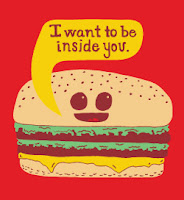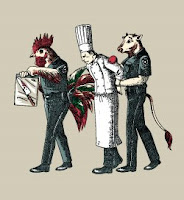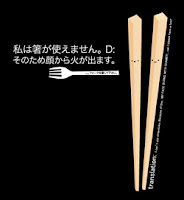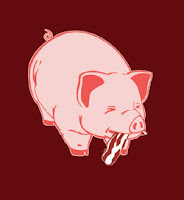 In today's Short Order blog, Lee Klein of Miami New Times offers a baffling and seemingly self-defeating explanation of the NT's annual "Best of Miami"[*] listings. First, let me confess that I've never put much weight in this list, and really just stopped reading it entirely when a couple years ago they gave the "Best Restaurant Wine List" award to Maroosh, a perfectly serviceable Middle-Eastern restaurant whose wine list is - really, no exaggeration - less exceptional than many convenience stores I've been to. Seriously. Unless of course you consider a horizontal collection of the ubiquitous, mass-production Kendall-Jackson "Vintner's Reserve" to be impressive (they have the Chardonnay, the Zinfandel, the Cabernet Sauvignon AND the Merlot!). This was such an insult both to the several local restaurants that make an effort to put out interesting, fairly priced wine lists, and the diners who genuinely give a crap about such things, that I just stopped reading "Best of Miami." I didn't even look at the thing last year.
In today's Short Order blog, Lee Klein of Miami New Times offers a baffling and seemingly self-defeating explanation of the NT's annual "Best of Miami"[*] listings. First, let me confess that I've never put much weight in this list, and really just stopped reading it entirely when a couple years ago they gave the "Best Restaurant Wine List" award to Maroosh, a perfectly serviceable Middle-Eastern restaurant whose wine list is - really, no exaggeration - less exceptional than many convenience stores I've been to. Seriously. Unless of course you consider a horizontal collection of the ubiquitous, mass-production Kendall-Jackson "Vintner's Reserve" to be impressive (they have the Chardonnay, the Zinfandel, the Cabernet Sauvignon AND the Merlot!). This was such an insult both to the several local restaurants that make an effort to put out interesting, fairly priced wine lists, and the diners who genuinely give a crap about such things, that I just stopped reading "Best of Miami." I didn't even look at the thing last year.Besides, I'm just not a big believer in the whole "best" concept. Maybe I'm just incapable of making decisions or lacking in strong opinions (unlikely), but I find most matters, food or otherwise, to be too nuanced to declare such absolute superlatives. Best Spanish? I love Michelle Bernstein's contemporary take on tapas at Sra. Martinez, but I also like the more straight-ahead versions at Xixon; I also love the callos and ensalada rusa at Copas y Tapas, and the bacalaitos at Taberna Giralda, to say nothing of the more formal dinner fare at Ideas. Is one the "best"? I couldn't say; depends what I'm in the mood for any particular day. Dim sum? Tropical is the most consistent, but I had better chicken feet at Mr. Chu's on South Beach (before it closed - here's hoping they reinstate dim sum at the new Coral Gables location). These kinds of lists draw in readers (and, thusly, advertisers), but I don't think they usually mean all that much.
But the New Times' preemptive defense, hoping to avoid the "catcalls of derision," just gives me more reasons to disregard the latest list:
We do try to choose what we think is the best in each category, but with the same set of unofficial caveats that Oscar voters abide by. For instance, we are just as hesitant to name the same winner for the same item two years in a row. Do our readers need to read that Garcia's makes a great fish sandwich year after year after year? We think not.So, if readers are looking for, say, the best fish sandwich, they should only rely on New Times every other year? This is the "Best of Miami - Unless You Were the Best Last Year"? How do I know whether this is the year that really has the "best," or this is the year that you decided to list someone else just for the sake of variety?
Plus nowadays every publication and online food site has their own set of bests -- do we really need to read that Garcia's makes a great fish sandwich 20 times a year?No. Agreed. Completely. But then - and maybe I've lost my train of thought here - what exactly is the point of this "Best of Miami" thing anyway?
On the other hand, you can't put together a credible overview without giving nods to those establishments that everybody knows are deserving. So we mix it up -- best actor this year, best supporting the next. And we are also extremely unlikely to give more than one nod to any restaurant in any one year -- so if your favorite steak house didn't win Best Steak House, it may be because it won Best Restaurant In South Beach. Or vice versa.So if, again, let's say I'm looking for the best fish sandwich in Miami, and it happens to be one of those years that the place that actually has the best fish sandwich in Miami isn't being listed for "Best Fish Sandwich in Miami" (because that would be so boring), I should instead look in, say, the category for "Best Restaurant that has Park Benches In Back Looking Out on a Somewhat Dingy But Still Slightly Charming in its Own Way Part of the Miami River"? Very helpful. And once again, if "everybody knows" what restaurants are deserving of awards, then what, exactly, is the point of publishing the list?
This is for those bloggers -- and I'm talking to you, Chowhounders -- who annually blather on about how our more questionable picks just have to be attributed to an attempt to please advertisers. Let me say, once and for all, that this is simply not the case, and never has been -- both in terms of our Best Of issue, and all other writing. Period.[**]Just for the record, I have never said that. And in fact, the numbers tend to bear it out - sort of. You can take a look at the 2008 Best of Miami listings, and only a small fraction of the award-recipients are advertisers, and there are certainly a lot more advertisers than awards. On the other hand, I suspect - and this may tie into the now-acknowledged "let's mix it up regardless of who's really the best" philosophy - many current advertisers have been recipients of prior awards, and vice versa. I am not a subscriber to the "advertiser conspiracy" theory; however, it shouldn't give anyone much comfort that some picks are so outright bizarre that the most natural explanation that occurs to some readers is that they must be paid for.
But I do think New Times' own explanation for its "best of" decision-tree is reason enough to doubt its reliability, independent of the unsubstantiated rumors of advertiser influence. If the purpose is really to just pick the "best" in any category, it shouldn't remotely matter whether the same place was named previously. Spreading the wealth around, just for the heck of it, does little to assist diners and undermines whatever credibility the publication might otherwise have.
It seems that the implicit message is "It's all just entertainment, don't take it too seriously, we're just trying to sell a newspaper here after all." (Of course, being a free paper, what they're really selling is advertising.) And I understand that. But sadly, the "Best of" Primer presents a very compelling argument for why anyone who really cares about finding the best food in Miami may well find New Times' "Best of Miami" largely useless in that endeavor.
Update: I posted a paraphased version of this as a comment on the Short Order post, and Lee Klein gave a pretty lengthy, earnest response. It hasn't changed my mind on much, but it does provide some further explanation. As some have already noted in comments here, there's nothing wrong with provoking a healthy debate over food.
[*]Image at top via Miami New Times.
[**]I don't think anyone's bothered to mention the New Times "Best of Miami" list on Chowhound for more than two years, so "annually" would seem to be a stretch. But nonetheless, it's nice to know that Lee Klein is reading Chowhound for reasons other than just picking up ideas on what restaurant to visit next - "Gustavo the hairdresser"? Really?














































